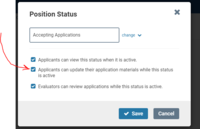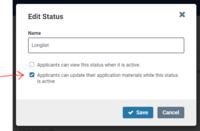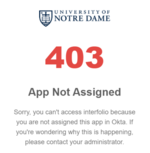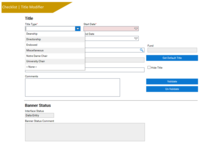Mac OnBase Users - Virtual Desktop
We wanted to provide you with advanced notice that the OIT will be decommissioning RemoteApps in early 2021. This will impact Mac Users as RemoteApps is the VPN used to access OnBase.
In place of the RemoteApps, the OIT has created OnBase Virtual Desktops that can be logged into from a web browser without using a VPN. By logging into the virtual desktop, users will be accessing a Windows-based interface with OnBase already installed. During our pilot testing phase, users found the virtual desktop environment experience much easier and faster to use than going through RemoteApps. We believe this will be a welcomed change and look forward to transitioning users to virtual desktops over the next few months.
The Office of the Provost will schedule a zoom training session to help users become familiar with the virtual desktop OnBase environment in the near future.
Appointment Letters
With the transition to a new Provost, some of the appointment letter templates in Box had to be updated with Marie Lynn's name. In doing so, the version number on those appointment letters was updated to Version 4. Because the version number refers to the entire set of currently approved appointment letter templates, all of the other templates have been updated to include "Version 4" in the footer as well. Please be sure to refer to the Box when creating an appointment letter to ensure you have the latest version of the appointment letter template.
Interfolio Q&A
We have received a few similar questions from around campus so we thought it would be helpful to share some of those Q&As.
Q. Where do my positions in Interfolio get advertised through Job Elephant?
A. Job Elephant will automatically push the positions in Interfolio to a few different job boards at no cost to the unit.
- Higher Ed Jobs
- Higher Education Recruitment Consortium (HERC)
- DirectJobs
- JuJu
- Jobmanji
- Google for Jobs
- USMilitaryPipeline.com
Q. Why can’t applicants to my position modify their submitted application?
A. In the Position Status be sure the setting that allows applicants to update their status is checked.

If an Applicant Status is applied to a candidate (e.g. Longlist, Shortlist, etc.), be sure the setting that allows a candidate to update their status is checked.

For step by step instructions on changing status settings or navigating to the settings, visit the Interfolio Faculty Search support site or reach out to Joe Lyphout (jlyphou1@nd.edu) with questions.

Q. I added a graduate student as an evaluator to a search in Interfolio but they receive a 403 error message when they try to log in. What else needs to happen for them to have access to the position?
A. Reach out to Joe Lyphout (jlyphou1@nd.edu) and he will add the graduate student to an “include Google Group” so they have access to Interfolio.
Q. Does every applicant need an applicant status and disposition code assigned to them?
A. All Regular Faculty applicants, even those eliminated from the pool in the first pass of reviews need an applicant status and disposition code assigned to them. Directions on how to apply applicant statuses and disposition codes can be found on the Office of the Provost's Interfolio Training and Search Resources page.
Q. How do I find individual applicant responses to the Race, Ethnicity, Sex, and Religion questions from the IRIF?
OnBase Q&A
Q. When entering a title (named chair) for a faculty member, which Title Type do I chose?

A. There is currently a misalignment of terms with the Academic Articles and the values found in the OnBase system. When the Academic Articles were revised in July 2019, the terminology used to describe "Named University Chairs" was already being used in our data systems for a different purpose. We are working to revise the OnBase and reporting systems so they match the Academic Articles, however, in the meantime, we wanted to help provide an explanation of the terms found in OnBase and the reporting systems.
There are currently six title types to choose from in the dropdown list of the Title data modifier screen.
- Deanship - Used when a Dean has a named title associated with holding the dean appointment. For example, “I.A. O'Shaughnessy Dean of the College of Arts and Letters”.
- Directorship - Used when a faculty is the director of an institute or center if that director position comes with a named title while holding that appointment. For example, Rex and Alice Martin Director of the Notre Dame Deloitte Center for Ethical Leadership. This is not used unless the director has a named title associated with their directorship.
- Endowed - Described in the Academic Articles as “named University Chair positions”, this is used for Tenured Professors who are appointed after having been approved through a Named University Chair Review Committee. For example, the “H. Clifford and Evelyn A. Brosey Professor of Electrical Engineering”.
- Miscellaneous - We ask that you not use this title type.
- Notre Dame Chair - Used for those who have been gone through a Named University Chair Review Committee but the benefaction-based chair has not been funded or identified yet and a place holder title is awarded. For Example, the “Notre Dame Chair of Finance”.
- University Chair - Used for those who have been appointed to a named professorship but did not go through a Named University Chair Review Committee. For example, the “Robert and Irene Bozzone Associate Professor of Economics”.